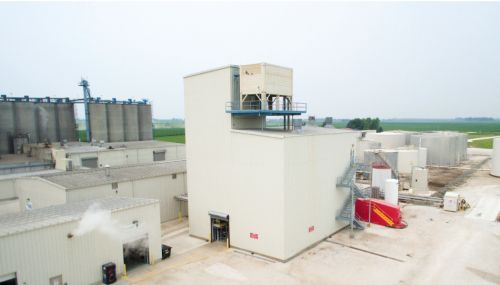All
Leaps of Faith
by John MacKenna

Long Island energy marketer Raymond Hart and his family have come a long way since 1978.
Hart entered the heating oil industry as a one-truck operator who made deliveries himself after finishing his day’s work at his gas station. Today, his family runs three companies, including a vital inland terminal that supplies heating oil and Bioheat® blends to many Long Island marketers, including his own retail Bioheat company, Hart Home Comfort.
Hart has gotten ahead in business by spotting opportunities and pursuing them aggressively. He and his family made a big move in 1998 when they purchased the Western Nassau Oil Terminal, in New Hyde Park, N.Y. “When we looked at the terminal, it sort of hit me that there was nothing else like it in the area,” he said. “It had six rack positions. It was on an acre of land, which was sufficient for what we needed, and it had a rail spur that was buried. I thought, “There’s got to be something we can do with this.’”
Doing the Right Thing
Hart took another big chance in 2006, when he decided to commit his heating oil business (then known as Hart Petroleum) to biodiesel blending and marketing. There was no governmental support in place yet, as neither the New York State Clean Heating Fuel Credit nor the New York City Bioheat mandate had been enacted, but he knew he wanted to sell biodiesel blends. “Economically there was no reason to do it, but socially and environmentally we just knew it was the right thing to do,” Hart explained. “We had no idea how we were going to make more money. At the time we were paying 20 cents more a gallon for biodiesel than for heating oil.”
Hart Home Comfort now sells a branded version of Bioheat known as ecoblend®. The company website describes the fuel as “a biodegradable and nontoxic home heating oil alternative” that “burns cleaner and is virtually free of sulfur and other impurities.”
He was so committed to Bioheat that he decided to outfit one of the racks at his terminal (now known as the New Hyde Park Oil Terminal) with an expensive system for in-line blending, also known as injection blending. He got a grant from the New York State Energy Research and Development Authority (NYSERDA) to cover some of the cost and literally put his family’s home on the line by taking out an equity loan to cover the balance. It was a big roll of the dice, but Hart believed the injection blending option would help differentiate his terminal. “With injection blending, the fuels are added at the same time,” he said. “Industry studies say that is the best way to blend.”
The gambles have paid off, as Hart Home Comfort has grown into a thriving full-service home comfort provider, and New Hyde Park Oil Terminal now moves 5 million gallons of biodiesel and 15 million gallons of heating oil annually. The terminal features a 420,000-gallon aboveground tank and two underground tanks, each with a capacity of 41,000 gallons.
A True Family Business
Energy marketing is a family business for the Harts. Ray Hart’s daughter Jacqueline Hart is Vice President of Operations, his daughter Laura Hart-Marra is Vice President of Transportation, and his son Raymond Hart Jr. is Vice President of Terminal Operations. In addition to the terminal and the home comfort company, the family owns Hart Trucking, which operates a fleet of trucks that provide petroleum bulk transportation for Long Island fuel dealers.
The family has a tradition of making business decisions together, often while seated around a folding card table. When Ray Hart wanted to buy the West Nassau Oil Terminal in 1998, he had little support in his inner circle. “My bankers were against it, my accountant was against it, and my wife was against it. So I fired my accountant, changed banks, and kept my wife—and I bought the terminal.”
Today, the terminal is an important link in the biodiesel supply chain. Leading producer REG markets biodiesel there, which is blended with heating oil from wholesalers such as Global, Sprague and Bayside. An energy marketer can have an account with one of the petroleum wholesalers and purchase truckloads of heating oil injection-blended with biodiesel from REG.
Over time, the once-neglected rail spur emerged as a critical asset for the biodiesel side of the business. Hart unearthed and rebuilt it, and today the spur enables REG to deliver substantial quantities of pure biodiesel by rail car. The terminal is outfitted with heating units for the railcars and pumps for transloading to tanker trucks. It can accommodate up to 10 rail cars, each carrying 25,000 gallons of biodiesel. There is also 82,000 gallons of biodiesel storage in stationary tanks.
The Harts have reinvested in the terminal every year. Improvements include raising the racks by three feet to accommodate taller trailers; resurfacing with concrete; and adding a steam boiler to heat the biodiesel in the rail cars.
A Fruitful Relationship
REG is both a supplier and a customer for Hart, and he says the relationship is profitable for both companies. As a supplier, REG provides the biodiesel that Hart blends with ultra-low sulfur heating oil for his Long Island customers. As a customer, REG markets biodiesel through the terminal.
REG and Hart have each improved their own businesses by working together. REG helps Hart Home Comfort compete effectively with competitive pricing on its high quality REG-9000 biodiesel, and Hart provides valuable feedback from the petroleum industry that makes REG a more effective supplier. “They know biodiesel better than anyone, and we know the market,” Hart explained. “We listen to the customers and pass on what we learn. When REG succeeds, we succeed, because we get more customers, which is better for our terminal and gets more volume moving through.”
Hart came to REG as a key account of Ultra Green Energy Services when REG purchased Ultra Green in 2012. Hart has worked with a number of suppliers since 2006 but is now exclusive with REG. “We need reliable volume, and we have never had any issues with supply with REG,” Hart said. “If the rail is backed up, they will get a transporter to bring the product in here. REG really knows the rail system, and they have all their bases covered with backups in other locations. They can move product quickly. When we look at their strategic advantages, it is a no-brainer.”
He is excited about his future with REG, “They are flexible, and they listen to you, which is very beneficial,” Hart said.
New York City is the first jurisdiction to require the use of biodiesel-blended heating oil, and Hart’s terminal sells a lot of biodiesel blends to dealers in New York City’s boroughs. With the City contemplating a move from B2 to blends of B5 and higher, Hart believes REG is well positioned to meet the City’s needs. “New York City is ready for B5, and REG can play a big role, because they are a good supplier with ample locations and access to rail at multiple points, including the New Hyde Park Oil Terminal,” he said.
Hart believes that Bioheat marketing is the best future path for the heating oil industry. If marketers and governmental authorities will commit to Bioheat, the industry will be more stable going forward, and heating oil will improve its image. “We now have a fuel that makes us look modern and clean and eliminates the need for foreign oil,” he said.
Related Posts
 Why Quality Matters in Your Biofuel Blends
Why Quality Matters in Your Biofuel Blends
Posted on June 25, 2025
 Incorporating Higher Blends of Biofuels
Incorporating Higher Blends of Biofuels
Posted on May 14, 2025
 NORA Programs at Eastern Energy Expo
NORA Programs at Eastern Energy Expo
Posted on May 13, 2025
 March Short-Term Energy Outlook
March Short-Term Energy Outlook
Posted on April 28, 2025
Enter your email to receive important news and article updates.
